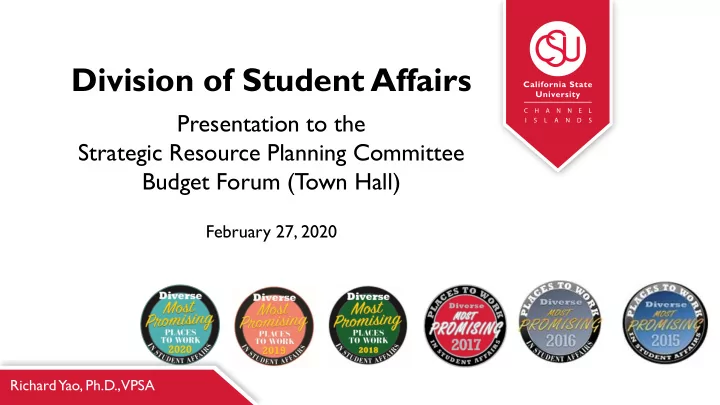

Division of Student Affairs Presentation to the Strategic Resource Planning Committee Budget Forum (T own Hall) February 27, 2020 Richard Yao, Ph.D., VPSA
DSA DSA Budge Budget t Princip Principles les • Reallocate and prioritize existing DSA resources in support of Strategic Initiatives. • Use of data to inform short and long-term planning (descriptive, inform interventions, evaluate programs). • Enhance revenue generation. • Remain flexible in an effort to preserve momentum towards strategic initiatives.
2019 2019-2020 D 2020 DSA SA Budge Budget R t Review view • Internal reallocations (no request for FTE or dollars) • 2 administrator positions • 3 staff positions • Reallocation Requests: • $48,912 of administrator dollars to staff dollars to aid creating an SSP IV within the area of ROI. • $12,900 of DSA funds to increase the total amount of EOP scholarship awards to $200,000. • Permanent Requests: • .5 FTE (the dollars had been reallocated internally) (CARE CM) • 1.0 FTE and $57,000 (Basic Needs CM)
Division of Student Affairs Retention, Outreach Associated Students Housing & Vice President’s Campus Life & Inclusive Student Inc. Residential Education office Services Academic Advising Disability Housing Services & DSA Data & Associated Students Accommodations & Operations Assessment Basic Needs Support Services DSA Budget & Staff CARE Team Student Union Residential Education Educational Opportunity Resources Program Campus Recreation Summer Conferences Inclusive Student VPSA Support Commuter Services Services Counseling & Promoting Achievement Psychological Services Through Hope (PATH) New Student Orientation Student Support Services Parent & Family Programs Underrepresented Student Conduct Student Initiatives Student Health University Outreach Student Leadership Multicultural Dream Student Organizations Center & Involvement Retention Initiatives & Veterans Affairs Summer Programs Program Waterfront Programs & CIBC Wellness Promotion & Education
Gen Gener eral Fund al Fund (FY 19 (FY 19-20 20 Distr Distribut ibution ion by by Division) Division) Student Affairs , DSA: $7.466 million in GF 7.0% • $6.221 million in salary + benefits • $1.245 million in operations Business & Financial Affairs , 31.1% Academic Affairs , 55.6% Advancement, 4.5% Office of the President, 1.8%
DSA Ope DSA Operating Budget ting Budget (FY 19 (FY 19-20 20 by by Fu Fund nding ing Sou Source ce) General Fund Allocation: $7.46 million Associated Students, Inc. & Student Body Total DSA budget: $19.92 million Center Fee, 9.9% Health Services Fee & General Fund, 37.5% Health Facility Fee , 6.5% Recreation and Athletics Fee, 4.6% The funding sources to the right Housing & Res Ed , 43.8% (in blue shades) are restricted Bond payments not included in budget
DSA DSA Priorities Priorities 2018 2018-2019 2019 2019-2020 2019 2020 • Intentional outreach and support • Ensuring accurate utilization data for FTFT cohort to increase student (with student ID’s) for all DSA engagement. programs. • Phase II of the DSA Assessment • Examining our outcomes Plan (includes data collection on assessment for all DSA programs. student learning outcomes for all • Improving and strengthening programs). collaborations with Academic • Development of comprehensive Affairs. student wellness initiative. • Strengthen collaborations with Academic Affairs.
Key Da ey Data ta Points: oints: DSA DSA Reac each Fall 2018 Spring 2019 Total Headcount 7095 6763 DSA Involvement 5465 (77%) 4848 (72%) Commuter Total Headcount 5499 5254 Commuter Student 3905 (71%) 3409 (70%) DSA Involvement
Key Da ey Data ta Points: oints: DSA DSA Reac each h - FTFT FTFT Fall 2018 FTFT DSA (n) Non-DSA (n) 1 Year Retention FTFT (all) 77.4% (878) 69.6% (69) HUGS FTFT 79.3% (555) 68.1% (47) First Generation FTFT 77.5% (347) 70.6% (34) Pell Eligible FTFT 77.6% (499)* 63.2% (38) HS GPA 2.0-2.99 65.7% (233) 38.5% (13) HUGS HS GPA 2.0-2.99 68.2% (148) 22.2% (9) Commuter FTFT 86% (279)* 72.1% (61) Avg. Units Completed 12.53* v. 11.33 % with at least 1 DFWI: 42.71% v. 46.4% HUGS FTFT: 12.35* v. 10.94 HUGS FTFT: 44.5% v. 57.4%
Key I ey Initia nitiativ tives es • First STEPS: professional mentoring/success coaching for FTFT who are not part of cohort-based support program (e.g., EOP/TRiO, LLC, embedded peer support) • Targeted 600+ FTFT; 244 have met with staff member; 366 total sessions. • Largest referrals: Advising, Career Development, LRC, Writing Center. • Immigration Legal Services for Students and Employees: free of charge to CSU students and employees. • CO collaboration managed through Underrepresented Student Initiatives/MDC. • Academic Advising: mandatory advising for FTFT; team-based advising model. • Student Learning Outcomes Assessment
Key I ey Initia nitiativ tives es • Student Wellness Initiative • Case Management Model: Basic Needs, CARE & CAPS • Basic Needs Partnership Grant: $560,000 • Mental Health Partnerships Grant: $125,000 • Ekho’s Clothing Closet/Food Pantry Expansion • Living-Learning Communities • NSSE/BCSSE Data Analysis
QUES QUESTION TIONS/DISCUSSI S/DISCUSSION ON
Recommend
More recommend